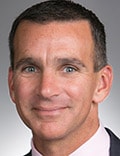As physicians well know, magic wands don't exist. If they did, every patient would recover in the exam room, prior authorization wouldn't exist, and continuing medical education credits would be printed on bearer bonds.
But in the spirit of suspended disbelief, we asked physicians and other contributors what their three wishes would be for their patients, practice/hospital, and health systems. Because, hey — we all need to dream.
 |
Suzanne C. Boulter, MD Adjunct Professor of Pediatrics and Community and Family Medicine Geisel School of Medicine at Dartmouth Hanover, New Hampshire |
Patients: An end to gun violence
Practice/Hospital: Adequate staffing and pediatric bed availability
Health system: Universal access to health insurance
 |
Sarah G. Candler, MD, MPH Care Team Medical Director Director of Academic Relations Iora Primary Care | Northside Clinic Houston, Texas |
Patients: Systems of health that start with communities of safety, including access to affordable housing, food, transportation, and healthcare
Practice/hospital: I.N.T.E.R.O.P.E.R.A.B.I.L.I.T.Y.
Health system: Clinician leadership that has the power (often aka funding) to do what's right, not just what's right in front of us
 |
Arthur L. Caplan, PhD Bioethicist NYU Langone Health New York, NY |
Patients: I wish for patients in the United States greater access to affordable primary care. There are still too many people without insurance or a reasonably accessible quality provider. And I especially wish for the rapid expansion of affordable training programs to meet staffing needs, including more scholarships, 3-year programs, and more new primary care–oriented schools.
Hospital: Increased staffing, especially nursing. There are too many retirements, too much burnout, and too much privatization into boutique practices to ensure the ability to provide high-quality, safe, patient-oriented care.
Health system: I wish for health systems to seriously move into electronic medicine. While billing has become electronic, there is still much to be done to supplement diagnosis, training, and standardized data collection on key metrics. Systems are not yet behaving in a manner consistent with the hype in this regard.
 |
Stephen Devries, MD Executive Director, Gaples Institute (nonprofit) Adjunct Associate Professor of Nutrition Harvard T.H. Chan School of Public Health Boston, Massachusetts |
Patients: Patients continue to demand more from their healthcare professionals and insist that they are offered evidence-based counseling on nutrition and lifestyle strategies.
Practices: Quality-based reimbursement for medical services will take hold that will incentivize much-needed preventive care.
Hospitals: Hospitals will more fully embrace the role of serving as true centers of health and focus as much on preventive medicine as on the more lucrative areas of high-tech treatment.
 |
Peter D. Friedmann, MD, MPH Chief Research Officer Baystate Health Springfield, Massachusetts |
Seconded by:
 |
Elisabeth Poorman, MD General Internist University of Washington Clinic Kent, Washington |
Patients: Don't forget the ongoing epidemic of substance use disorder, a major cause of premature mortality.
De-scheduling of cannabis and expungement of cannabis-related convictions.
Hospital: Commitment of hospitals and practices to address stigma and ensure delivery of medications for opioid use disorder in primary care, the emergency department, and inpatient settings.
Health system: Reform of antiquated methadone regulations to permit office-based prescription and pharmacy dispensing to treat opioid use disorder, as is the case in most of the world.
 |
Robert Glatter, MD Emergency Physician New York, NY |
Patients: I want all patients to understand the enormous strain the healthcare system has been under — not just with the pandemic, the tripledemic, and mpox, but well before the onset of these public health crises.
Hospital: The medical profession has endured not only burnout but a growing mental health crisis, staffing shortages, a physician addiction crisis, and increased attrition in the decade leading up to the pandemic. The pandemic was like a punch in the gut, occurring at the most inopportune time one could imagine.
Health system: The intersection of health and the state of our public health deserves important mention. Unless we take action to bolster our public health infrastructure, our healthcare system will be in jeopardy, unable to handle the next pandemic, which could be just around the corner.
 |
William E. Golden, MD Medical Director of Arkansas Medicaid Professor of Medicine and Public Health University of Arkansas for Medical Sciences Little Rock, Arkansas |
Patients: Affordable options for diabetes and obesity management
Health system: Greater investment by health systems and third-party payers in primary care infrastructure
 |
Gregory A. Hood, MD Baptist Health Lexington, Kentucky |
Patients: To embrace the gift of getting out in the world, being active, and connecting with others — having put down the screens.
Health system: To be freed from the financial gamesmanship of the insurers as they continue to serve their goals of promoting their hedge fund investing over meaningful and productive partnering with primary care physicians, and that they gain insight that they are one of the main reasons they can't find PCPs to connect with to render care in disadvantaged environments — because they made it economically impossible to do so.
 |
Robert H. Hopkins, Jr, MD Associate Professor of Internal Medicine and Pediatrics Director of the Division of General Internal Medicine University of Arkansas for Medical Sciences Little Rock, Arkansas |
Patients/health system: I would wish for staged implementation of universal basic health coverage for all, perhaps closest to the French or Canadian model. This would need to be coupled with expanded funding for nursing education, graduate medical education, and tracing of other health-related professionals.
 |
Harvey Hsu, MD Banner Health Phoenix, Arizona |
Patients: More clear guidelines that are simple to understand. This can apply to colonoscopy (now age 45), immunizations, blood pressure goals. I wish medications were not as expensive so patients can take the best medicine for them and not stop taking them when they hit their donut hole in coverage.
Practice: We have been functioning on a leaner basis to cut down costs. When the pandemic hit, turnover was high and we lost PAs, nurses, front-office staff, and physicians. Having adequate staffing is probably number one on many lists. One way we dealt with lack of staffing was converting in-person visits to telehealth. Video visits are paid the same as in-person visits, but if the patient could not get their video to work, then it would be a telephone visit. Now many insurances do not even pay for telephone visits. So I would wish that we could still be reimbursed for telehealth visits.
Health system: I would wish for our health system to recognize the extra work required to take care of patients while improving quality and meeting quality measures. Allowing more time for patient visits could be one way to meet those goals or having more support staff to make sure patients get their colonoscopy/mammograms done, improve their sugars, and take their medications.
 |
Jan L. Shifren, MD Vincent Trustees Professor, Obstetrics, Gynecology and Reproductive Biology Harvard Medical School Director, Midlife Women's Health Center Massachusetts General Hospital Boston, Massachusetts |
Patients: I wish for patients to be actively involved in all aspects of their care, well informed with shared decision-making.
Practice: I wish for the enormous time demands of electronic medical records and documentation to not distract from the pleasure of caring for patients.
Health system: Patient care remains at the center of decisions and programs.
 |
Timothy J. Joos, MD, MPH Internal Medicine/Pediatrics Seattle, Washington |
Health system: I wish someone could figure out how we could be reimbursed for the quality of care we provide instead of the volume of patients we see. I wish EMRs could become less complicated and more user-friendly rather than needing advanced training to use.
 |
Peter Kovacs, MD Medical Director, Kaali Institute IVF Center Budapest, Hungary |
Patients: I work as an infertility specialist, so when we talk about infectious diseases and associated risks, we talk about a minimum of two (female and male partner) and ideally three (plus the pregnancy) individuals. We have learned that SARS-CoV-2 affects reproductive health. It may compromise sperm production, could delay fertility treatment, could be associated with lower success rates; and if the treatment is successful, it may harm the pregnant woman/fetus/newborn. The best preventive measure that we can offer is vaccination. One cannot emphasize the importance of preventive measures, paying attention to personal hygiene and social distancing. Therefore, I wish those planning to become pregnant to listen to their healthcare provider and accept the recommended vaccines to minimize the risk of getting infected and to minimize the risk for severe disease, especially if one undergoes successful fertility treatment and achieves a long-desired pregnancy.
Practice: During the 2022 calendar year we had many days when one or more employees were out of work on sick leave. This puts extra stress on the others to allow uncompromised work in the clinic. In addition, we all have to work in a less comfortable environment if we consider mask use every day, all day. For healthcare workers, vaccination is mandated but many still are affected by milder forms of coronavirus infection and other respiratory diseases. Therefore, I wish my colleagues patience toward the preventive measures to lower the individual risk for infections. As a result, hopefully we will have a less stressful 2023.
Health system: Many resources had to be delegated to dealing with acute and chronic COVID, and this was at the expense of routine daily elective and preventive medical services. I wish the healthcare system to return to normal daily operations, to have the personnel and financial resources to carry on with the required preventive and elective medical services to avoid long-term consequences of not being able to provide such services. It would be sad if we had to treat otherwise preventable illnesses in the upcoming years that went undiagnosed and/or were not properly managed due to limited resources as the result of the pandemic.
 |
Alan R. Nelson, MD Internist-Endocrinologist, retired |
Patients: Expansion of the FDA's authority into over-the-counter drugs, including the veracity of their advertising claims.
Practice: Make diabetes drugs available at a reasonable cost.
Health system: With the expansion of Medicaid eligibility during COVID-19 coming to a close, federal government actions are necessary for those who once again have been dropped from coverage to have their legitimate needs met.
 |
Kevin Powell, MD, PhD St. Louis, Missouri |
Patients: To be cared for and about, and not just medically, even when illness strikes and health fails.
Hospitals: To hear the thankfulness of a grateful public for the care you provide, and to hear that above the angry noise of outraged individuals who spout vitriol and focus on how they believe others have harmed them.
Health system: A truer understanding of mercy and justice.
 |
Margaret Thew, DNP, FNP-BC Director, Department of Adolescent Medicine Children's Hospital of Wisconsin Milwaukee, Wisconsin |
Seconded by:
 |
M. Susan Jay, MD Professor of Pediatrics, Chief of Adolescent Medicine Medical College of Wisconsin and Children's Hospital of Wisconsin Milwaukee, Wisconsin |
My wish for patients, hospital, and system: Health, calm, and grace.
 |
Mark P. Trolice, MD Director of Fertility CARE The IVF Center Winter Park, Florida |
Patients: To be proactive in their healthcare and be their own advocates. Question when unclear and only consult credible resources.
Practice/Hospital: Improve support of physicians and all healthcare providers to allow more input in their practice operations and growth.
Health system: Reduce interference of the "business of medicine" and ensure that the patient experience is the priority.
 |
Charles P. Vega, MD University of California, Irvine |
Three minutes on a routine basis for everyone in healthcare to reflect on our blessings and the honor and gravity — as well as joy — that are integral to healthcare. Three minutes that will also help us to recognize our challenges and put them in the proper context. I know: 3 minutes is not meeting any standard for reflective practice. But it's 3 minutes more than I have right now.
 |
Karen Breach Washington, MD Medical Director WellCare of North Carolina/Centene Charlotte, North Carolina |
Seconded by:
 |
Lillian M. Beard, MD Physician Director Children's Pediatricians and Associates Silver Spring, Maryland |
Patients: Access to affordable healthcare
Hospitals: Resources to care for patients (sufficient number of beds and a healthy staff)
Health system: Equity for all
 |
Andrew Wilner, MD Host of podcast The Art of Medicine with Dr. Andrew Wilner www.andrewwilner.com |
Let's put patients first! Too many extraneous considerations other than the patient's best interest obstruct optimal patient care.
Here are just a few examples of patients coming last instead of first.
If a patient needs to start a new medication in hospital, we shouldn't have to wait until the patient is an outpatient because "that's when insurance will pay."
If there's a new medication that's better than the old medication, we shouldn't be forced to choose the old medication and provide inferior care because "that's when insurance will pay."
If patients need to stay in hospital, we shouldn't be pressured to discharge them because the hospital has decided that decreasing "length of stay" is its highest priority.
Dr Francis Peabody said it best in 1927: "The secret of the care of the patient is in caring for the patient." How hard is that?
In 2023, why don't we follow Dr Peabody's sage advice from nearly 100 years ago and see what happens?
 |
James M. Wooten, PharmD UMKC School of Medicine, University Health - UMKC Kansas City, Missouri |
Patients: I want patients to understand and properly realize the advantage of vaccinations — not only for COVID-19 but also for influenza. There is so much misinformation that I spend a lot of time trying to convince patients to get vaccinated. Most patients don't realize that through their lives, most of them have already been vaccinated for something just to be able to attend school. How the COVID-19 vaccine created so much stigma makes little sense to me. I also want patients to understand that COVID-19 vaccination and boosters do not always prevent infection but will many times prevent severe infection. I believe that better patient communication and education is the key and will always be the key to improving vaccination numbers. Not only communicating and educating patients on vaccination itself but also making patients realize that personal vaccination decisions may affect what happens to your neighbor. Allowing infection means that you may be more likely to infect someone else. As a society, we must take care of each other.
Health system: It will be interesting to see what happens when vaccines are no longer reimbursed by the federal government. Understanding which vaccines work best and are better tolerated will be key to choosing appropriate vaccine brands. Healthcare providers will need to be very selective regarding which vaccines are selected for formulary inclusion. Thorough meta-analysis studies must be done to provide more evaluable information to allow for appropriate selection. "Knowledge is power! " Appropriate knowledge will help distinguish which vaccines work best for various patient populations.
Follow Medscape on Facebook, Twitter, Instagram, and YouTube
Credits:
Lead image: Carrie Webster/Dreamstime
Medscape Internal Medicine © 2023 WebMD, LLC
Any views expressed above are the author's own and do not necessarily reflect the views of WebMD or Medscape.
Cite this: Three Wishes: The Changes Health Professionals Want - Medscape - Jan 18, 2023.







Comments